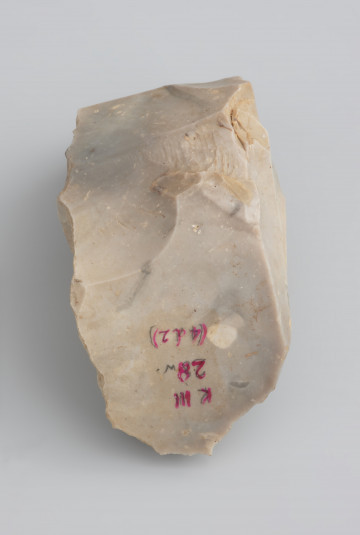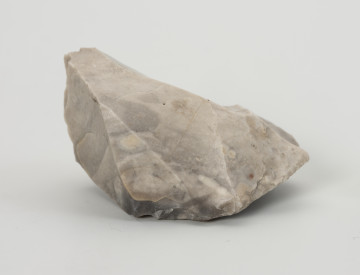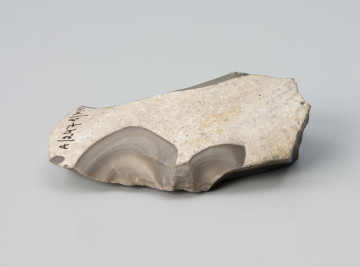
Prismatic chipboard core
10800 p.n.e. — 9000 p.n.e.
National Museum in Szczecin
Part of the collection: Stone Age
The post-mining tool was found in Kocierz, the Gryfice district, on a site that is a part of a complex of workshops connected with high-quality flint mining and processing. It is the only Late Palaeolithic workshop excavated in Western Pomerania. The tool is made of chalk flint of very high quality. Initially, it was the so-called prismatic core used to produce elongated chips, which after the cessation of mining, it was reworked into this distinctive tool. Alterations included changing the shape of the sides and shaping the blade. The tool was attached to the handle with animal tendons or thongs. The too-tight wrapping resulted in the chipping of one of the edges. The maker intended to obtain a tool helpful in excavating lumps of flint. Its function is indicated by the way the edges are shaped, which is more characteristic of pickaxes and hoes (one-sided shaping) than of tools for working in wood (two-sided shaping). In the case of woodworking, such an edge would quickly be destroyed and useless, while it was of little importance during digging. The tool from Kocierz was probably not used very intensively. Apart from the damage to one of the sides, there are no visible traces, such as shiny surface or broken edge.
Michał Adamczyk
Author / creator
Dimensions
cały obiekt: height: 8.3 cm, width: 3.8 cm
Object type
lithic core, lithic core, lithic core
Technique
carving, soft masher carving, hard masher carving
Material
flint, stone
Origin / acquisition method
field research
Creation time / dating
Creation / finding place
Owner
National Museum in Szczecin
Identification number
Location / status

10800 p.n.e. — 9000 p.n.e.
National Museum in Szczecin

10800 p.n.e. — 9600 p.n.e.
National Museum in Szczecin

3900 p.n.e. — 2600 p.n.e.
National Museum in Szczecin
DISCOVER this TOPIC
Museum of King Jan III's Palace at Wilanów
DISCOVER this PATH
Educational path